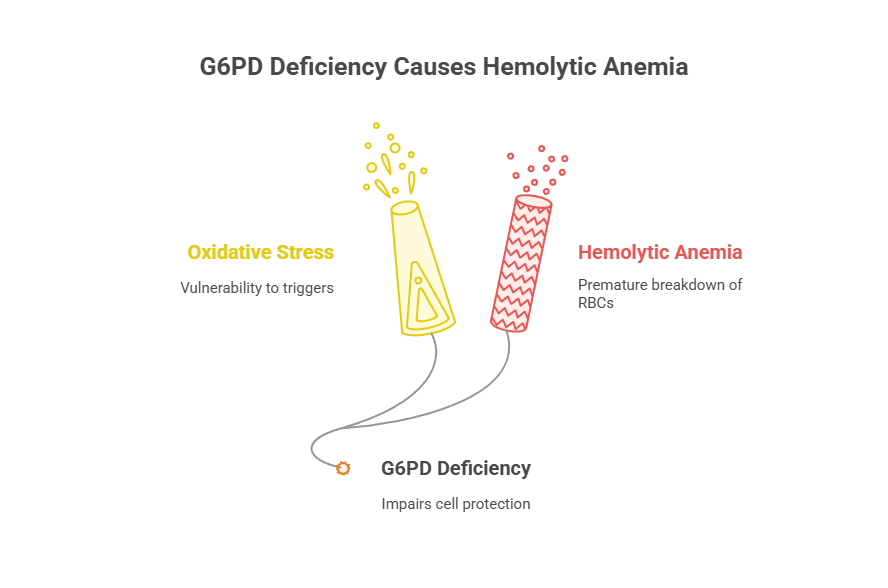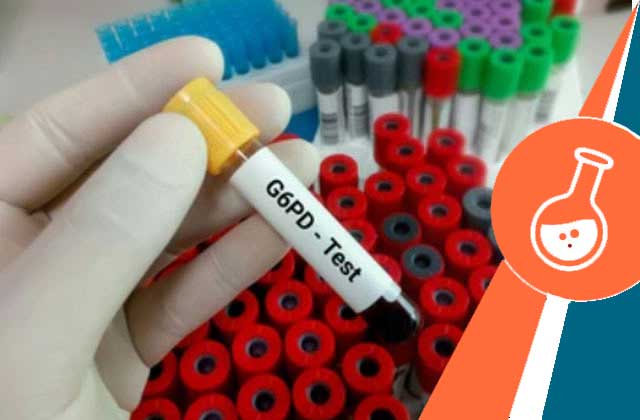
What is G6PD Deficiency Test
G6PD or glucose 6 phosphate dehydrogenase is an enzyme that is responsible for protecting your body cells from chemical and environmental damage, especially against free radicals-induced damages. G6PD deficiency is a genetic disorder that occurs due to malnutrition and a change in the genetic predisposition in your G6PD gene.
This enzyme plays a crucial role in the functioning of your RBCs. In case of a deficiency, your RBCs might not receive adequate amounts of oxygen and start to break down, otherwise referred to as haemolytic anaemia.
G6PD deficiency alone might not cause haemolytic anaemia or other health complications. A G6PD test helps your healthcare provider understand whether you have glucose 6 phosphate dehydrogenase deficiency or not and the associated risks and complications.
Even though you might not be exhibiting any symptoms, you may have G6PD deficiency. So, your healthcare provider may recommend a G6PD deficiency test to gauge your G6PD levels against the normal level.
About G6PD Deficiency Blood Test
Learn everything about the G6PD blood test, before you book lab test online. Understand the why, how, and what of this test.
Why Do I Need G6PD Deficiency Test?
Your healthcare provider will recommend a G6PD deficiency diagnosis test if you
- Are exhibiting signs of G6PD deficiency as a trigger to consuming broad beans, viral and bacterial infections, medications, such as sulfa meds, malaria meds and antibiotics
- Are exhibiting signs of severe fatigue
- Have pale or yellow skin, yellow eyes, an unusually dark skin and dark urine
- Have back pain, belly pain, shortness of breath, weakness and confusion
- Have a family history of G^PD deficiency
Your healthcare provider may also recommend G6PD screening test for your newborn if the jaundice symptoms don’t go away on its own within 2 weeks. While jaundice is quite common in newborns, if it goes untreated may cause severe complications.
How to Prepare for the G6PD Deficiency Test?
400 million people worldwide have G6PD deficiency and most of them might or might not show symptoms. Men are more likely to have glucose 6 phosphate dehydrogenase deficiency symptoms than women. Thus, on-time G6PD testing are recommended.
Your healthcare provider will suggest not to consume certain supplements and medications, such as antibacterial, antifungal medicines, anticonvulsants, diuretics, etc. as these may interfere with your G6PD quantitative test results. You might need to reschedule the test if you are exhibiting active signs and symptoms of haemolytic anaemia.
Finding G6PD Deficiency Blood Test
Should you book blood test online to check your G6PD level or go to the nearest clinic and get it done by a medical professional? Let’s Find Out
Can I Take G6PD Deficiency Test At Home?
Yes, the glucose 6 phosphate dehydrogenase deficiency blood testing can be taken at home. HealthcareOnTime’s at-home lab testing service in association with Thyrocare, provides a convenient and efficient way to get important medical tests done from the comfort of your place, without the need for a doctor’s visit or a trip to a lab. It is always preferable to consult with a healthcare provider about any concerns regarding your test results.
How Much Does G6PD Test Cost?
Are you curious about the G6PD Test price? At HealthcareOnTime, we believe in providing cost-effective solutions to keep you informed about your lipid profile.
The G6PD Test price may vary depending on several factors, including your location, the healthcare provider, and your insurance coverage. However, we’re pleased to offer this essential test at an affordable rate of just INR 662! Our prices not only compete in the market but also maintain the highest quality standards.
In India, the cost of a glucose 6 phosphate dehydrogenase deficiency Test typically starts from INR 850, but prices may vary based on the specific laboratory and city. Monitoring your G6PD status is crucial, especially if you have concerns related to certain medications or susceptibility to hemolytic anemia
But here’s the exciting part – HealthcareOnTime is committed to making healthcare accessible to all. We provide valuable services, including affordable G6PD Deficiency Testing, in over 4500+ pincodes nationwide.
Test Result Interpretation
You’ve received your G6PD blood test results but may still need assistance in determining whether they fall within the normal range. Read this section to gain a better understanding of whether your results are within the typical range for G6PD.
What Does G6PD Deficiency Test Results Mean?
The results of the G6PD level test may vary from person to person depending on a number of factors.
The G6PD test normal range is 5.5 to 20.5 units/gram of Haemoglobin for adults. Anything beyond this level, may mean a G6PD deficiency but not necessarily arrive at that conclusive diagnosis.
A moderate G6PD deficiency is considered a condition in which the G6PD level in your blood is at 10% to 60% of the normal range. People with moderate deficiencies may have haemolytic anaemia, which can be managed. If your G6PD level is less than 10% of the normal range, it is deemed a severe G6PD deficiency.
Why Choose HealthcareOnTime?
Convenience at Your Doorstep
Ever wished for healthcare that comes to you? HealthcareOnTime makes it a reality with doorstep lab testing, cutting out clinic hassles. No more queues or travel stress. Experience at-home sample collection, prioritizing health without time constraints. —your path to health, now just a doorstep away!
Affordable Testing with Thyrocare Partnership
Experience cost-effective lab testing at-home with HealthcareOnTime’s exclusive partnership with Thyrocare. Benefit from competitive prices while ensuring precise results. Our collaboration with Thyrocare Technologies Limited guarantees affordability without compromising on the accuracy and reliability of your lab test.
Comprehensive Health Screening
At HealthcareOnTime, we’ve got your back with our comprehensive health checkup packages! Take charge of your well-being by booking online. These packages empower you to stay ahead, catching potential issues early for timely management. It’s like having a health ally, and making informed decisions for a healthier, happier life.
Disclaimer: Although we have endeavoured to provide accurate information on this page, we strongly recommend that you seek advice from your doctor before relying on any of the test ranges or lab-test recommendations mentioned herein.
Sources
Ref Links:
More Related Tests
Why To Book with HealthCareOnTime

17 Crores+ Samples Processed

World Class Technology Labs

25+ Years of Trust & Experience











